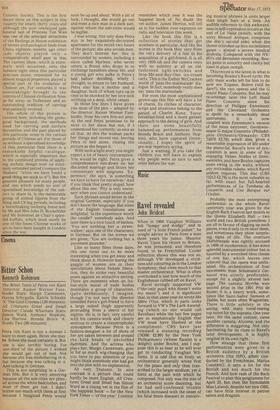Music
Ravel revealed
John Bridcut
When in 1908 Vaughan Williams felt "lumpy and stodgy" and in need of "a little French polish", he sought advice in Paris from a man three years his junior, Maurice Ravel. Upon his return to Britain, he was presumed, and therefore found, to be Frenchified. Cooler reflection shows this was not so, although VW developed a vividness and colouring as in the London Symphony, that owes much to that master orchestrator. What is often overlooked is just how much of the Englishman rubbed off on Ravel.
Ravel strongly supported VW ("the only pupil who doesn't write my music") and it is significant that, in that same year he wrote Ma Mere l'Oye, which in parts looks forward to VW's The Lark Ascending (which no one would call Ravelian) while the last few pages are so emphatically English that VW must have blushed at the compliment. CBS have just released a stunning • recording (76306: £2.99) by the New York Philharmonic (whose flautist is a delight) under Boulez, and I suppose this is as near as he will ever get to conducting Vaughan Williams. It is odd that so lively an orchestrator generally wrote first for the piano and only then transcribed to the larger medium, yet it hints at the pain with which he composed. Not only was the size of an orchestral score daunting, but he had self-confessed trouble (which increased with the onset of his fatal brain disease) in conceiv
ing musical phrases in units larger than single bars at a time. An audible reference to this awkwardness in self-expression occurs at the end of La Valse (which, with the witty Menuet Antique, comprises the disc's second' side) when the theme is broken up into incontinent gasps — almost a severe musical dyslexia. Compared with the NYPO's old Bernstein recording, Boulez gains in sonority and clarity but loses in plain oomph.
This record is the latest in what is becoming Boulez's Ravel cycle: the only main works left for him to do now are Tzigane, Bolero (will he dare?), the two operas and the G major Piano Concerto. But he may re-attempt later the Left Hand Piano Concerto since his direction of Philippe Entremont and the Cleveland Orchestra is spoilt by a remarkably dead instrument. It is now coupled with Entremont's version' of the more extrovert, Gershwinesque G major Concerto (Philadelphia Orchestra/Ormandy: CBS 73070 £2.79) which alas, gives a reasonable impression of life under the piano-lid. Ravel's love of syncopation is seen in some of his engaging Valses Nobles et Sentimentales, and here Boulez captures more swing in the waltz, without any noticeable rubato, which Ravel seldom requires. This disc (CBS 73212 E2.79) is the most valuable so far, with exact but full-hearted performances of Le Tombeau de Couperin and Une Barque sur l'Ocean.
Probably the most enterprising celebration in the whole Ravel centenary year was given by the English Bach Festival last month in the Queen Elizabeth Hall — two world and two British premieres. I am all in favour of digging up such pieces, even if only to re-inter them, and sometimes they show surprising signs of life. The overture Shehdrazade was rightly accused in 1899 of incoherence; it has some splendid instrumental colour but is haunted by a wretched oboe theme of one bar, which leaves one relieved that the opera was unfinished. His orchestration of four movements from Schumann's Carnaval was utterly predictable, except for a slightly altered last page. The cantata Myrrha won second prize in the 1901 Prix de Rome; it is a heavy work, sometimes like Saint-Saens' Samson et Dalila, but more often Wagnerian. There is little subtlety in the setting, with many tonsil-tearing top notes for the soprano. One year later, for the same contest, came another cantata, A/ycone, and the difference is staggering. Not only fascinating for its clues to Ravel's later development, it is highly original in its own right.
How strange that these first performances were given to a British audience by a British orchestra (the NPO, albeit conducted by the Frenchman, Marius Constant): it says a lot for the British and not much for the French. And how rash of the Bach Festival to plan this programme for April 23, but then the formidable Miss Lalandi, despiite her new OBE, can have little interest in patron saints and dragons.


























 Previous page
Previous page